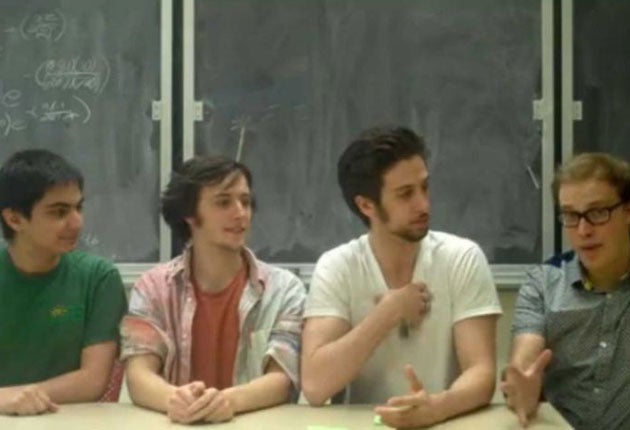Rhodri Marsden: Can four guys take on Facebook – and win?
Cyberclinic

Your support helps us to tell the story
From reproductive rights to climate change to Big Tech, The Independent is on the ground when the story is developing. Whether it's investigating the financials of Elon Musk's pro-Trump PAC or producing our latest documentary, 'The A Word', which shines a light on the American women fighting for reproductive rights, we know how important it is to parse out the facts from the messaging.
At such a critical moment in US history, we need reporters on the ground. Your donation allows us to keep sending journalists to speak to both sides of the story.
The Independent is trusted by Americans across the entire political spectrum. And unlike many other quality news outlets, we choose not to lock Americans out of our reporting and analysis with paywalls. We believe quality journalism should be available to everyone, paid for by those who can afford it.
Your support makes all the difference.I just tried to make a list of the things that Facebook knows about me. I started with mundane stuff that anyone reading the printed version of this column would already know – my name, my gender, the fact that I'm an unwilling sufferer of male-pattern baldness. It knows I'm currently obsessed with a band called Everything Everything, because I persist in sharing their videos on Facebook despite one friend thinking that they represent some kind of punk rock betrayal. It knows where I was on Friday, because I mentioned it, and it knew where I was going to be last Tuesday about two weeks in advance. It also knows the precise pattern of the ebbs and flows of my real-life crushes, because I click through to those people's pages more often than others and comment casually on things they've said or done. Basically, it knows more about my day-to-day life than an overprotective mother – which mine isn't, I hasten to add.
We occasionally have these surges of realisation; the last collective one was back in May, when Facebook once again made "simplifying" alterations to its privacy settings that were actually as confusing as British train ticket pricing policy. The moment was seized upon by four New York college kids who, referring to themselves as "Team Diaspora" in a video shot in a classroom, outlined their utopian vision of social networking: you remain in control of all your data, you own it and look after it, share whatever you like with whoever you like, and at no point hand it over to a central hub that can log that information. They aimed to raise $10,000 to complete Diaspora as a summer project, but timed their announcement to such perfection that $200,000 came rolling in – including, strangely, a donation from Facebook CEO Mark Zuckerberg, who described it as a "cool idea". Now, all eyes are on these unassuming individuals as they prepare, in the next few days, to release the initial code for what's seen as the driving force of "antisocial networking".
"Facebook killer" is a headline-grabbing phrase, but the chances of Diaspora becoming anything more than a prompt for further discussion of privacy issues seem slim. Firstly, there's a limit to what four young men with no track record can achieve in the first three months out of university. (I wouldn't for a moment offer myself up as a benchmark, but over a similar period in 1992 I mainly sat in a van and got drunk.) But more importantly, Facebook feels unassailable. It's colossal. It has made it easy and free to establish and maintain social connections; Diaspora, by contrast, will require us to find a chunk of webspace to install it, and maintain it once we have. Can we be bothered? Many Facebook users understand that with convenience comes a privacy trade off – in essence, free web hosting in return for spying. Many others don't know, or simply don't care. None of these people, who make up the vast majority of Facebook's users, will use Diaspora. Its user base will be a relative handful of tech-savvy people who are either keen to escape Facebook, or have already.
As one insightful commenter noted, Facebook is only really a problem for those who don't use it. To prise people away from it will mean a groundswell of people deciding, as law professor Eben Moglen did recently, that Zuckerberg has "done more harm to the human race than anybody else his age". But it's more likely that people are grateful to him for allowing them to play Farmville until 3am, or letting them keep tabs on people they fancy. Casual stalking for the win, as the internet generation might conceivably say.
***
The link between cutting-edge gaming and vanquishing evil foe is never likely to disappear, but one Modern Warfare 2 player by the name of Glen McCracken has caused a minor stir this week by announcing that he aims to reach level 70 of the game without killing anything. It's possible to work your way through World of Warcraft by gathering herbs, sure, but this release in the notoriously bloodthirsty Call Of Duty series will prove more of a challenge, not least because other players are unlikely to want McCracken on their team any more than they'd want to play football with someone who doesn't believe in scoring goals. So far, in an admirably selfless quest, he has reached level 11 with zero kills but has died 272 times in the process. Peace, brother.
Join our commenting forum
Join thought-provoking conversations, follow other Independent readers and see their replies
Comments